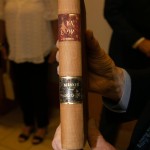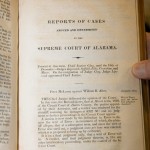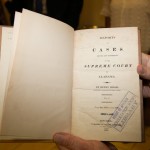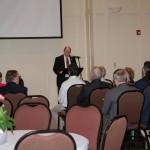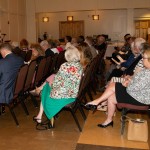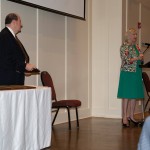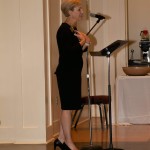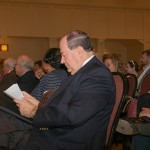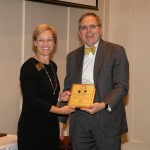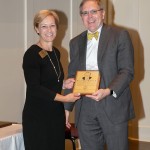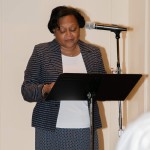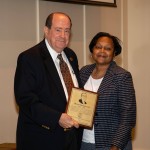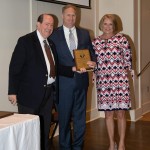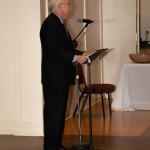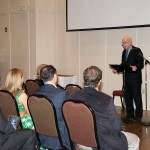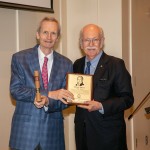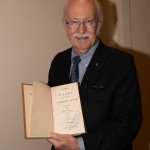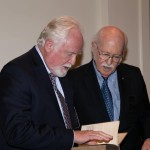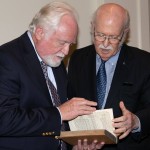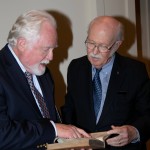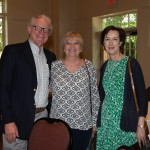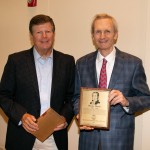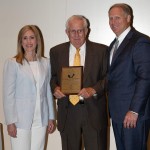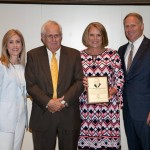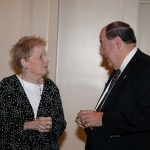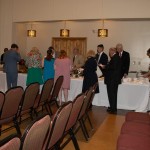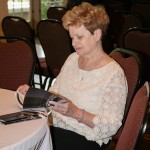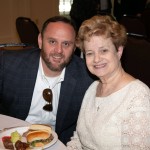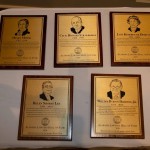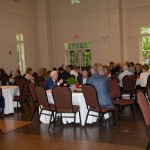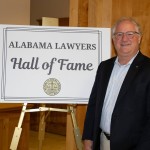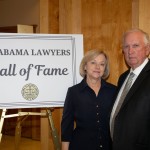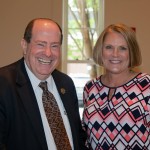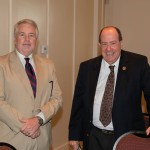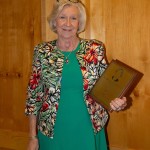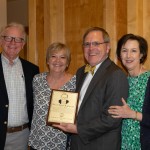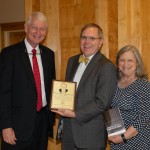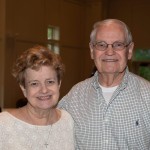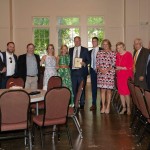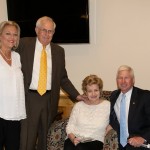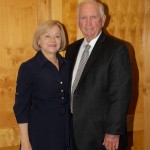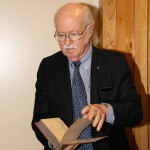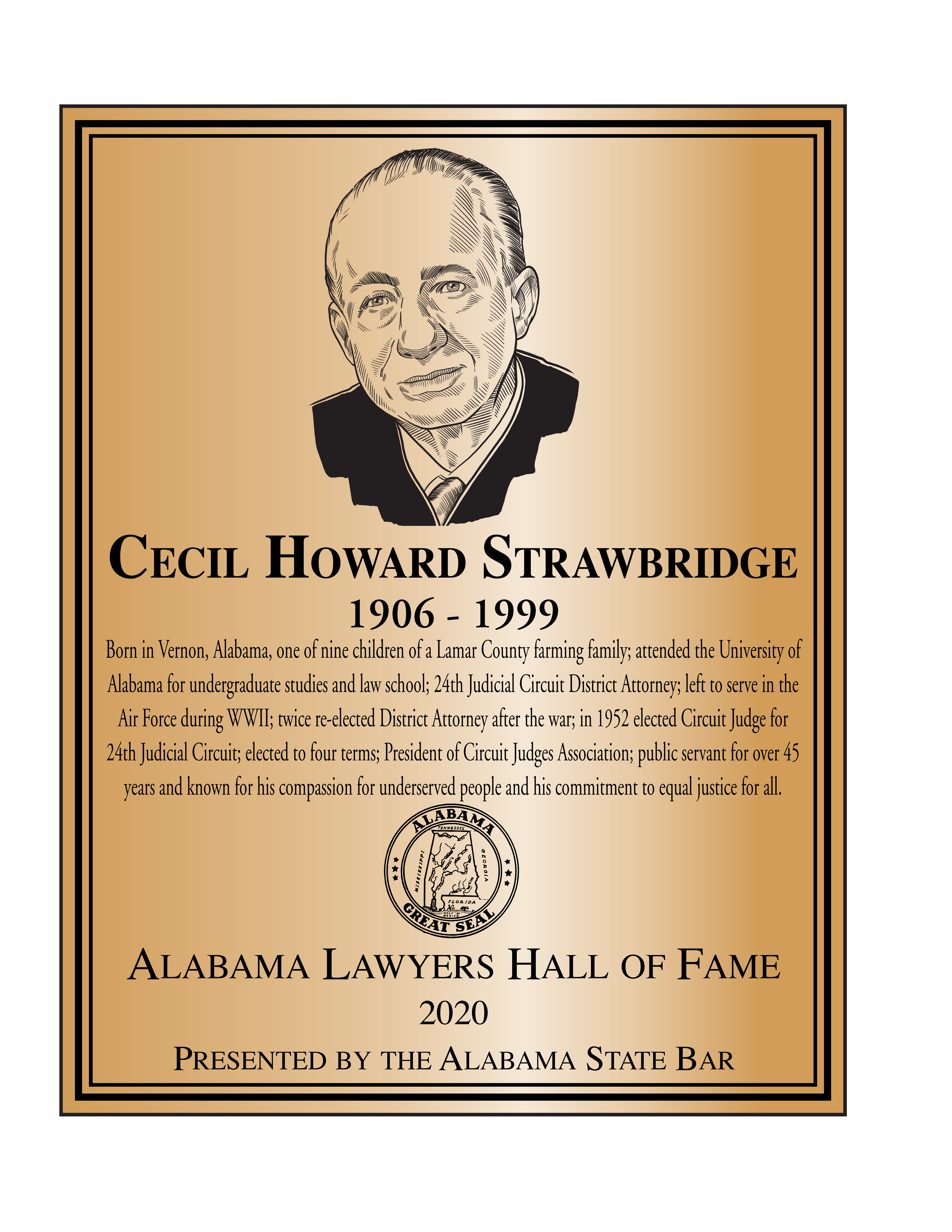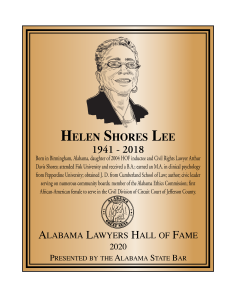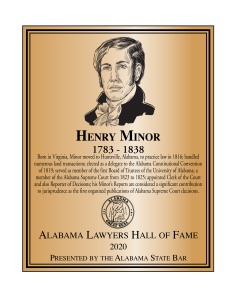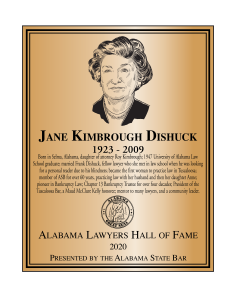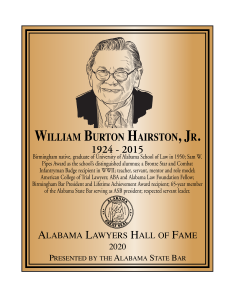News Post
Alabama Lawyers Hall of Fame Adds Five New Members
Published on May 23, 2022
MONTGOMERY – The Alabama State Bar on Friday, May 13, 2022, inducted five new members into the Alabama Lawyers Hall of Fame at a ceremony at The Cooper House in Huntsville. The five members, Cecil Howard Strawbridge, Helen Shores Lee , Henry Minor, Jane Kimbrough Dishuck, and William Burton Hairston, were selected as the 2020 inductees, but the induction ceremony was postponed until May 2022, due to the COVID-19 pandemic.
“The five new selectees of the Hall of Fame who represent the finest exemplars of the Alabama legal profession. We hope that all of their stories will serve to inspire the present and future citizens of Alabama,” said Sam Rumore, Jr., chair of the Hall of Fame Selection Committee.
Photos from the Induction Ceremony
Judge Cecil Howard Strawbridge, who presided over the 24th Judicial Circuit for nearly a quarter of a century, was born February 24, 1906, in Vernon, Alabama, to Samuel and Tezzie Strawbridge. Judge Strawbridge was one of nine children born into a local farming family. He was a Lamar County High School graduate, received an undergraduate degree from the University of Alabama in 1929, then a law degree from the University of Alabama School of Law in 1931. While a student at the University of Alabama, Judge Strawbridge maintained multiple jobs in Tuscaloosa. Each summer, he returned to Vernon to work in a sawmill to repay the owner for the loans that provided the money necessary to attend school.
Following graduation from law school, Judge Strawbridge entered private practice in Vernon and later was appointed county attorney. In 1942, a love of politics prompted him to run for district attorney for the 24th Judicial Circuit, which comprises Fayette, Lamar, and Pickens counties. After his election, he volunteered for the Air Force and served until the end of World War II. He returned to the circuit after his military service and twice was re-elected district attorney.
In 1952, he ran for circuit judge and won. Judge Strawbridge began that six-year term in January 1953 and would be re-elected to three more terms before he reached the state’s mandatory retirement at age 70. He continued to serve as supernumerary judge for different counties in the state. He also served as vice-president and president of the Alabama Circuit Judges Association in 1967-1968. In all, Judge Strawbridge proudly held public offices for 45 years. The love of his life and wife of 58 years, Autense, was tirelessly by his side throughout his career. His son Ronnie and daughter Shirley were also faithful campaign workers.
Even after his death on July 2, 1999, Judge Strawbridge is fondly remembered by constituents and friends in the 24th Judicial Circuit for having compassion for underserved people, a belief in equal justice, and making sure equal justice was available to all. The lessons he learned from his humble background and work ethic molded him into a tough but compassionate circuit judge. He related to people from all backgrounds and walksof life.
As stated in his nomination for the Hall of Fame from two of his grandchildren, Caroline and Ron, Judge Strawbridge’s life and career were evidence of his unique ability to motivate others beyond realizing their own potential. Judge Strawbridge considered part of his job as a judge to follow up with people after serving their sentences to offer encouragement and guidance as they returned to the community. In addition, Judge Strawbridge’s deep faith in the legal process and the legal profession to provide justice motivated his son and two grandchildren to follow in his footsteps.
Judge Strawbridge consistently maintained a modest attitude not only for his entire career but also for his lifetime. Judge Cecil Howard Strawbridge dedicated his life and career to helping others, and he served the legal profession in a manner that enhanced its good name.
Helen Shores Lee was born in Birmingham, Alabama on May 3, 1941 to Arthur Davis Shores and Theodora Warren Shores. She joins her father, Arthur Davis Shores, as an inductee into the Alabama Lawyers’ Hall of Fame. As the child of a prominent Civil Rights lawyer, Helen was subjected early in her life to racism and violence. In the book “The Gentle Giant of Dynamite Hill: The Untold Story of Arthur Shores and His Family’s Fight for Civil Rights” which she co-authored with her sister, Barbara Shores, Helen shared memories of living in the Smithfield Community in Birmingham. The Community was called Dynamite Hill because the homes belonging to Negro families were subject to many bombings. Helen’s family home was bombed on several occasions. Helen’s mother had to be hospitalized on one occasion when she received a concussion as she fell and hit her head after a bombing. Helen also remembered one occasion when her father prevented her from shooting at a white person who had driven up to their front porch and proceeded to call them awful names.
Helen attended A.H. Parker High School. She received her Bachelor of Arts degree from Fisk University in Nashville Tennessee. It was there that she was initiated into the Alpha Kappa Alpha Sorority, Incorporated. She joins her sorority sister, Mahala Ashley Dickerson, who is also an Alabama Lawyers’ Hall of Fame inductee. She met and married Robert M. Lee (Bob) in 1962. They were both tired of the racial climate that existed in Birmingham during that time. They moved to Los Angeles, California to try to get away from it. While she was in California, she received her Master of Arts degree in Clinical Psychology from Pepperdine University. However, that was not to be her final academic accomplishment. Helen returned to Birmingham and enrolled at Cumberland Law School at the age of forty-three. She received her Juris Doctorate degree from Cumberland Law School in 1987 and was subsequently admitted to the Alabama State Bar.
Bob and Helen are the parents of Robert M. Lee, Jr., Attorney Arthur Shores Lee, and Keisha Lee, Vincent Lee, Ashlee Lee, Trenton Lee, and Trevon Lee. Helen was involved in many civic and community organizations. Among them was her service as Chairperson of the Advisory Council of the University of Alabama at Birmingham’s Minority Health and Research Center; Trustee of Leadership Birmingham; Board member of Blue Cross Blue Shield of Alabama; the American Red Cross; United Cerebral Palsy; United Way of Central Alabama; the Birmingham Airport Authority; the Birmingham Chapter of the Links Incorporated; Jack and Jill of America; and Trustee of the First Congregational Church.
After her admission to the Alabama State Bar, Helen practiced with her father in the Shores and Lee law firm. She also served on the Alabama Ethics Commission. She was a member of the American Bar Association, the Birmingham Bar, the Magic City Bar, and the National Bar Association. In 2003, Helen was appointed to the Tenth Judicial Circuit Court of Jefferson County. She was the first African-American female to serve in the Civil Division in the Circuit Court of Jefferson County. She retired from the bench in 2016. Her intent was to continue to serve the community. She planned to volunteer at a local public school to counsel at- risk youth. Her former career as a clinical psychologist made her extremely qualified for that purpose. Unfortunately, she was unable to fulfill that mission. She died on July 2, 2018.
Henry Minor, the son of Thomas Carr Minor and Ann Redd Minor, was born on January 4, 1783, in Virginia. He read law under his uncle John Minor of Fredericksburg, Virginia. His uncle studied under George Wythe and was a prominent Virginia lawyer and politician as well as a Colonel in the American Revolution and a General in the War of 1812. Henry Minor married Frances Throckmorton Barbour on September 14, 1809, in Petersburg, Virginia.
Minor and his family moved to the Mississippi Territory in 1816, settling in Huntsville. Within three years of his arrival, Minor entered the political arena being elected as one of the Madison County delegates to the Alabama Constitutional Convention of 1819. He was esteemed in Huntsville and co- hosted a banquet for President James Monroe in June of 1819. In 1821, Minor was elected to the first University of Alabama Board of Trustees from the Fifth Circuit. He resigned this position in December of 1823.
On September 25, 1823, Governor Israel Pickens appointed Minor to temporarily fill the vacancy on the 3rd Judicial Circuit due to the death of the judge of that circuit. Since Minor lived in the 5th Circuit, he could not continue to serve as Judge of the 3rd Circuit without moving from Madison County. Fortunately for Minor, Clement Comer Clay resigned as judge of the 5th Judicial Circuit, so Minor ran for and was elected on December 19, 1823, defeating his opponent 40 votes to 35 votes in the General Assembly. At this time, the Supreme Court consisted of the judges of the six judicial circuits. Thus Minor, as judge of the 5th Circuit, automatically became a member of the Supreme Court of Alabama. On December 26, 1825, the General Assembly held another election for judge of the 5th Judicial Circuit. This time, after seven ballots, Minor lost 43 votes to 39.
On January 14, 1826, the General Assembly passed an act allowing the circuit judges, acting as the Supreme Court, to appoint a clerk of the Court. On July 3, 1826, Henry Minor was appointed clerk of the Supreme Court for a term of five years. Minor would be reappointed as clerk for two more 5-year periods. On February 1, 1828, pursuant to an act allowing the Supreme Court to appoint a reporter of decisions, Minor was appointed to that position also.
This appointment led to Henry Minor’s most important contribution to the law in Alabama, Reports of Cases Argued and Determined by the Supreme Court of Alabama, published in 1829 and known among the legal community as Minor’s Reports. The Supreme Court had been ruling on cases since May of 1820, but these rulings had not been published. Minor’s job as Reporter of Decisions was to dig into almost a decade of court records and replicate the rulings of the Court. In the introduction to the Reports, Minor writes, “My only materials for the arguments of Counsel, reported in the volume, were the briefs which could be found in the clerk’s office, and in some of the cases, notes taken several years since without any expectation of applying them to this purpose.” He concludes the introduction with “I have endeavoured to supply the seemingly urgent demand of the profession and the public for information as to the judicial decisions of this state. I must ask for their liberal indulgence for the imperfections of the Work.” Minor’s Reports contains over 430 decisions from May 1820 to July 1826 including the 24 decisions in which he, himself, delivered the opinion of the Court.
Henry Minor served as Reporter of Decisions until February 8, 1830. And he remained clerk of the Court until his death on January 1, 1838, at age 56. He had moved from Huntsville to Greene County in 1826 to be closer to the capital at Tuscaloosa. His ground-breaking Minor’s Reports, one of Alabama’s rarest law books, remains his most enduring legacy. The Bench and Bar of the State of Alabama is proud to induct Judge Henry Minor into the Alabama Lawyers’ Hall of Fame.
Jane Kimbrough Dishuck was born in Selma, Alabama on September 20, 1923. She grew up in Thomasville, Alabama. Her appreciation of the law began at an early age since her father, Roy Wood Kimbrough, was an attorney. She attended the University of Alabama for her undergraduate education and then enrolled at the university’s Law School. During her first year, like many students, she sought a part-time job. A fellow law student introduced her to Frank James Dishuck, a second-year law student, who was looking for a reader. He had been blinded as a result of an automobile accident during his high school years. She read law texts to him and assisted him in class. The rest is history! Frank graduated from law school in 1946. Jane graduated in 1947. They eloped on the day that Jane graduated from law school. They practiced law together in Tuscaloosa from 1947 to 1966 when Frank died from a sudden heart attack.
Jane Dishuck was the first woman to practice law in Tuscaloosa. Respected by her peers, she was tenacious in representing her clients, was considered to be an exceptional lawyer, and made a name for herself as both a private attorney and a community leader. From the time she started practicing law, she mentored young lawyers and her former clerks have gone on to successful careers including private practice, judgeships, and the Alabama Supreme Court. Her daughter, Anne Dishuck LaCoste, practiced law with her mother in the firm now known as Dishuck & LaCoste in Tuscaloosa.
Jane Dishuck practiced extensively in the area of Bankruptcy Law. She was a pioneer in this practice in Alabama and the United States. She served as a Chapter 13 Bankruptcy Trustee for four decades. Her work in this area of the law began as a pilot program which ultimately gained nationwide acceptance.
She was honored to become the first female President of the Tuscaloosa County Bar Association from 1976 to 1977. And she received the Maud McClure Kelly Award from the Women’s Section of the Alabama State Bar in 2008. In community activities she was a charter member of the Tuscaloosa chapter of Zonta International, a service organization for women in business and the professions which advances the status of women worldwide, was named Woman of the Year by the Tuscaloosa Business and Professional Women’s (BPW) organization in 2001, and through her work with the First United Methodist Church in Tuscaloosa, she helped establish Genesis House, a group home for at-risk children.
Jane Dishuck died in Tuscaloosa on August 20, 2009 after almost sixty years in the practice of law. Her legal experiences began during a time when a woman attorney could try a case before a jury but could not serve on that jury until substantial changes were implemented in 1966. She did not let any gender discrimination hold her back, and she reached professional and personal successes which the Alabama State Bar now recognizes with her selection to its Alabama Lawyers’ Hall of Fame.
William Burton Hairston, Jr., (Bill) was a Birmingham native and a professional every lawyer should want to emulate. His choosing to become a lawyer and graduating from the School of Law at the University of Alabama in 1950 has enhanced the legal profession of the state. Bill’s own view of a professional was that of “one who puts in more than one takes out”. Bill Hairston, Jr. spent a lifetime of “putting in” as a teacher, servant, mentor, or role model for several generations of Alabama lawyers, including his son, Bill III.
As a practicing lawyer for over sixty-five years, from the founding of his own law firm in 1951 and which exists today, he was a tireless advocate leader for the legal profession at the local, state, regional, and national level. He interrupted his education to serve as a combat infantryman in World War II. He was part of the bloody and heroic efforts in France and Germany that severed the Nazi ground forces to defeat them. He earned the Combat Infantryman Badge and the Bronze Star.
His professional and personal resumes reflect the leadership and service he brought to those arenas fortunate enough to benefit from the “sense of caring” as described in one of his favorite books, “A Touch of Wonder” by Arthur Gordon, which he often shared with others. He cared generously as a citizen, a lawyer, a husband and father, a churchman and friend.
His love and service in the Highlands United Methodist Church will be remembered for years to come as noted by a Senior Minister there. Teaching Sunday School for over fifty years, chairing the Board of Stewards and being instrumental in the creation of the Highlands Foundation are but a few of the many roles he played in the life of that church.
While devoted to his family, his church and the legal profession he was likewise a supporter of his alma mater. He was honored as an undergraduate with induction to Jason’s and ODK. He was a leader in his ATO fraternity. He was recognized by the School of Law for his support of legal education by being a fund raiser for the new law building. He was a recipient of the Sam W. Pipes Award as the school’s Distinguished Alumnus. A classroom in the Law School was recently dedicated in his honor.
As with law, Bill’s passion extended to his and his wife Louise’s (aka Weezie) shared love for the Alabama State flower, the camelia japonica. They cultivated and showed this beautiful flower throughout the Southeast. He was both a President and Show Chair for the Birmingham Camelia Society. He was a judge for the American Camelia Society.
His excellence as a lawyer was recognized with his election to the American College of Trial Lawyers. His fellowships in the American Bar Foundation and Alabama Law Foundation, and his receipt of the Birmingham Bar Association Lifetime Achievement Award demonstrate his impact in the law. He was honored by his election to the presidency of both the Birmingham Bar Association and the Alabama State Bar.
His lifetime of service did not preclude his maintenance of a full trial case load. He was described by colleagues as a lawyer who made you proud to be a member of the legal profession. His induction into the Alabama Lawyer’s Hall of Fame will do honor to those who preceded him and those who come after. He loved the law and lawyers and was loved and respected by the many who benefitted from his wise counsel.
